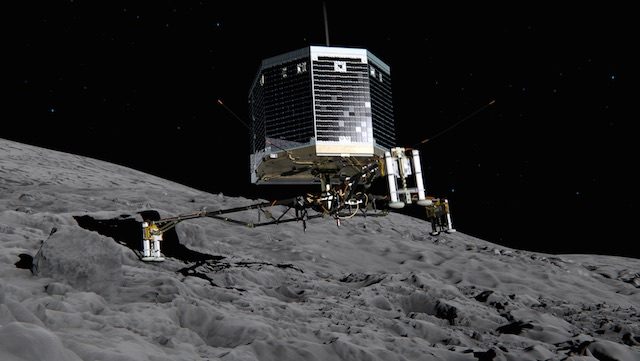SUMMARY
This is AI generated summarization, which may have errors. For context, always refer to the full article.

PARIS, France – Europe’s robot lab Philae phoned home on Friday, June 19, after several days of silence in its journey toward the Sun on the back of a comet, and is “doing very well,” the German Aerospace Center (DLR) said.
The latest contact lasted 19 minutes and is the third time that Philae has touched base with Earth since it landed on Comet 67P/Churyumov-Gerasimenko on November 12 after piggybacking on its mothership Rosetta.
The mission seeks to unlock the long-held secrets of comets – primordial clusters of ice and dust that scientists believe may reveal how the Solar System was formed.
After landing on the comet, Philae had used its stored battery power to send home reams of data before going into standby mode.
The hope was that as the comet approaches the Sun, solar energy would recharge Philae’s batteries enough for it to reboot, make contact, and ultimately resume scientific work.
It finally took 7 months before Philae woke up on June 13 from hibernation and made contact with Earth for two minutes. It reported back again just two days after that first contact.
Philae ‘doing very well’
On Friday, Philae transmitted 185 data packets back to Earth between 1320 and 1339 GMT.
“Among other things, we have received updated status information,” Michael Maibaum, a systems engineer at the DLR Lander Control Center in Cologne.
“At present, the lander is operating at a temperature of zero degrees Celsius, which means that the battery is now warm enough to store energy. This means that Philae will also be able to work during the comet’s night, regardless of solar illumination.”
The data transmitted also shows that the amount of sunlight available had increased.
“More solar panels were illuminated; at the end of contact, 4 of Philae’s panels were receiving energy,” said the DLR statement.
“The contact has confirmed that Philae is doing very well,” it added. – Rappler.com
Add a comment
How does this make you feel?





There are no comments yet. Add your comment to start the conversation.